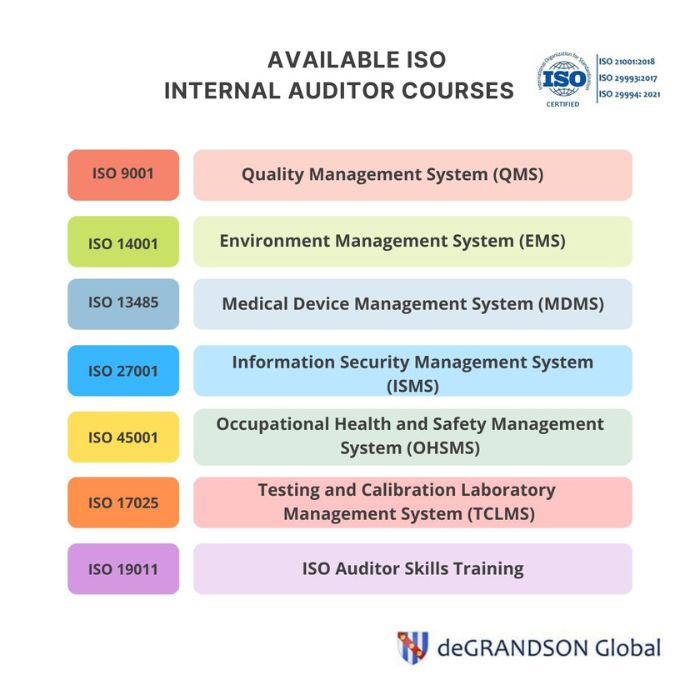The demand for ISO internal auditors has seen a noticeable increase in various industries in recent years.
While specific statistical data may vary based on region, industry, and economic conditions, the growing recognition of the value of compliance with international standards pushes the need for more skilled professionals proficient in conducting internal audits, ensuring compliance, and driving continual improvement in organizations.
However, before we talk about ISO internal auditors, let's first clear a common misconception about internal auditors.
Table of Contents
- What is the difference between an ISO Internal Auditor and an Internal Auditor?
- What Types of Industries Can ISO Internal Auditors Work in?
- What are the Advantages of Being a Certified Internal Auditor?
- How to become an ISO Internal Auditor
- What knowledge, skills, certifications, or characteristics do you need to become an ISO Internal Auditor?
- Education
- Specialized Training
- Certifications
- Professional Development and Work Experience
- Personal Attributes
- Does Internal Auditor Certification Apply to All Standards?
- Is Having an Internal Auditor Certificate Already Enough?
- How much does ISO Internal Auditor Certification Cost?
- Where to Find More Information if You Want to Become an Internal Auditor
What is the difference between an ISO Internal Auditor
and an Internal Auditor?
When people talk about internal auditors, they typically refer to auditors working in the financial sector. This association comes from internal auditors working in the financial sector, often having a visible and well-defined role due to the strict regulatory requirements and the critical nature of their industry's financial controls and risk management.
However, the scope of internal auditing goes far beyond the financial sector.
ISO internal auditors can work in a wide variety of industries, from manufacturing to healthcare, automotive to energy services, and food services to information security, among other examples. They carefully assess whether the organization's operations align with the strict criteria and principles set by international standards relevant to the said fields.
In contrast, non-ISO internal auditors examine a more comprehensive range of rules and systems. They check many different sectoral standards, internal rules, and industry-specific laws or unique quality systems requirements that a company may use. Their audits ensure the company follows all these rules and meets specific industry standards, not just ISO ones.
What Types of Industries Can ISO Internal Auditors
Work in?
ISO internal auditors can find work in various industries where adherence to international standards is critical for ensuring quality, compliance, and operational efficiency.
Some good examples of industries that frequently require the services of skilled ISO internal auditors are the following:
- Construction and Engineering: This sector heavily relies on ISO standards like ISO 9001 (Quality Management Systems) to improve processes and ensure quality in construction projects. Industries that can involve high-risk activities also prioritize ISO 45001 to ensure a safe work environment, reduce workplace accidents, and manage occupational health risks. Internal auditors help in maintaining compliance and improving operational efficiency in these industries.
- Healthcare and Pharmaceuticals: Compliance with ISO standards such as ISO 13485 (Medical Devices), ISO 9001 (Quality Management), and ISO 45001 are essential in ensuring patient and staff safety, quality healthcare services, and efficient management systems in these industries. ISO internal auditors make sure that this happens.
- Manufacturing and Industrial Sectors: Industries involved in manufacturing processes, production, and industrial operations need internal auditors who can successfully implement ISO 14001 to manage environmental impacts, reduce waste, and ensure sustainable practices.
- Information Technology (IT) and Cybersecurity: With ISO 27001 (Information Security Management) as a critical standard, the IT industry relies on ISO internal auditors to assess and enhance information security systems, data protection measures, and cybersecurity protocols.
- Financial Services: Adherence to standards like ISO 9001 (Quality Management) and ISO 27001 (Information Security) is crucial in financial institutions for ensuring service quality, risk management, and data security. ISO internal auditors help maintain compliance in these areas.
- Aerospace and Defense: Industries requiring strict quality control and safety standards, such as aviation and defense, adhere to ISO 9001 and AS9100 standards. ISO internal auditors are vital in ensuring compliance with these complex requirements.
- Energy and Utilities: ISO 50001 (Energy Management) and other ISO standards are crucial for efficient energy management and environmental sustainability in the energy sector. ISO internal auditors assist in monitoring compliance and implementing these energy-saving practices.
- Food and Beverage: Compliance with food safety standards like ISO 22000 is vital in ensuring the safety and quality of food products. ISO internal auditors verify adherence to these standards within the food and beverage industry.
What are the Advantages of Being a Certified Internal
Auditor?
As experienced internal auditors have knowledge of the processes and activities at many levels and functions within the organization, they are frequently chosen for promotion ahead of their colleagues.
How to become an ISO Internal Auditor
In general, there are five steps that you need to take to become an ISO-certified Internal Auditor.
- Acquire the temperament and personal attributes needed to be a successful Internal Auditor. Ideal attributes for internal auditors include being ethical, open-minded, diplomatic, observant, perceptive, tenacious, decisive, culturally sensitive, able to act with fortitude, etc.
- Gain the technical experience, subject expertise, supervisory and managerial experience needed to conduct an audit. See a list of 5 benefits of having trained internal auditors.
- Complete an ISO-certified internal auditor training course. You can choose between a 2-day conventional course or a 12-hour online course.
- Undertake internal audits as often as possible. Three times a year is considered the minimum number of internal audits needed to maintain auditing skills.
- Finally, have yourself evaluated as a competent internal auditor. Typically, this is done by a QHSE Manager or equivalent and recorded in your personal training/competency record.
What knowledge, skills, certifications, or characteristics do you need to become an ISO Internal Auditor?
Education
Although there are no specific academic requirements to become an ISO internal auditor, certain qualifications can give you an advantage if you are considering pursuing a career in this field. Below are some examples:
- Degree in Quality Management: A degree in Quality Management or Quality Assurance will give you foundational knowledge of quality principles, process improvement methodologies, and compliance frameworks, allowing you to understand ISO standards and auditing practices better.
- Engineering or Technical Degrees: Degrees in engineering disciplines or other technical fields offer a solid understanding of processes, systems, and technical aspects crucial in the operations of various industries. This knowledge base can be a big help when auditing technical processes and ensuring compliance with ISO standards.
- Environmental Sciences or Sustainability: Degrees in Environmental Sciences, Sustainability, or Environmental Management provide insights into environmental regulations, conservation practices, and sustainability principles that can be helpful in auditing compliance with ISO 14001 standards.
- Business Administration or Management: Degrees in Business Administration or Management offer a broader perspective on organizational structures, strategic planning, and operational frameworks. These are critical for understanding how ISO standards integrate into an organization's management systems.
- Health and Safety or Occupational Health Sciences: Degrees in Health and Safety or Occupational Health Sciences can provide expertise in workplace safety regulations, risk management, and health-related standards aligned with ISO 45001 requirements.
- Laboratory Sciences or Metrology: Degrees in Laboratory Sciences, Metrology, or similar fields can greatly help aspiring auditors targeting ISO 17025 standards. Understanding laboratory procedures, testing methods, and quality control principles is essential in this field.
Specialized Training
Specialized training designed to provide comprehensive knowledge and practical skills aligned with the requirements of specific ISO standards is crucial for individuals aiming to become proficient ISO internal auditors. These can include the following:
- ISO Internal Auditor Training Courses: These courses offer fundamental knowledge of ISO standards, auditing principles, methodologies, and practices specific to various ISO standards like ISO 9001 (Quality Management), ISO 14001 (Environmental Management), ISO 27001 (Information Security Management), and others. They cover topics such as audit planning, execution, reporting, and corrective action procedures.
- Lead Auditor Training Programs: Lead Auditor training programs go beyond basic auditing techniques and explore the nuances of managing and leading audit processes. Aspiring auditors who participate in this training become proficient in conducting audits and effectively directing and supervising audit teams.
- Industry-Specific Training: Some training programs specialize in specific industries or sectors and build content around the unique challenges and requirements of those industries. For example, industry-specific training for healthcare, manufacturing, construction, or information technology sectors provides focused insights and case studies relevant to those industries.
- In-house Training by Certification Bodies or Consultancies: Some certification bodies and consulting firms offer in-house training programs to address an organization's specific needs. These training sessions are conducted within the company's premises or virtually for its employees. They typically involve in-depth discussions, case studies, and practical examples directly relevant to the organization's operations.
Certifications
Several certification grades are available for individuals aspiring to become ISO internal auditors. These include:
- Internal Auditor Certifications: Specialist Training Providers offer internal auditor certifications tailored to specific ISO standards. These certifications validate individuals' abilities to conduct internal audits, assess conformity, and drive continual improvement within organizations.
- Lead Auditor Certifications: Various Training Providers offer certifications for lead auditors in different ISO standards. These certifications emphasize advanced auditing techniques, leadership in audit processes, managing audit teams, and overseeing complex audits.
- Certifications in Industry-Specific Standards: Training Providers might provide certifications specific to certain industries or sectors built around the same principles as specific ISO standards. Some examples include Certified Professional in Healthcare Quality (CPHQ) for the healthcare industry (ISO 9001), IATF 16949 Certification for the automotive industry (ISO 9001), AS9100 Certification for the aerospace and defense industries (ISO 9001), and FSSC 22000 (Food Safety System Certification) for the food industry (ISO 22000).

Available ISO Internal Auditor Courses Image Map. Click on any course you are interested in and see the full overview of each one, including course content, learning materials, etc.
Professional Development and Work Experience
Developing expertise as an ISO internal auditor requires a blend of professional development and hands-on experience. For example, regular participation in internal audits can get you valuable experience in compliance and process improvement.
Additionally, shadowing experienced auditors in the workplace can provide invaluable practical exposure to auditing methodologies and compliance frameworks.
Personal Attributes
Acquiring the temperament and personal attributes vital for success as an Internal Auditor involves developing a diverse set of skills and qualities that complement the technical aspects of auditing.
Below are some examples:
- Analytical Skills: Internal Auditors must possess strong analytical abilities to assess complex information, identify patterns, and draw conclusions. This involves critically reviewing processes, data, and documentation to pinpoint areas for improvement or potential risks.
- Attention to Detail: Being meticulous and detail-oriented is crucial. Auditors need to thoroughly examine records, processes, and systems to detect discrepancies, errors, or deviations from standards.
- Ethical Conduct: Upholding high ethical standards is imperative. Internal Auditors handle sensitive information and must maintain objectivity, integrity, and confidentiality throughout audits.
- Communication Skills: Excellent communication, both verbal and written, is essential. Internal Auditors need to articulate audit findings, explain recommendations clearly, and interact effectively with various stakeholders.
- Problem-Solving Abilities: Strong problem-solving skills enable auditors to identify root causes of issues, propose solutions, and effectively implement corrective actions.
- Adaptability and Flexibility: Internal Auditors encounter diverse situations and industries. Being adaptable and flexible helps navigate varying audit environments and respond effectively to changes or unexpected challenges.
- Assertiveness and Diplomacy: Balancing assertiveness with diplomacy is vital. Auditors should confidently pursue necessary information while maintaining positive relationships with auditees and colleagues.
- Curiosity and Continuous Learning: A curious mindset drives auditors to delve deeper into processes, seek innovative solutions, and stay updated with evolving regulations and industry best practices.
- Time Management and Organizational Skills: Auditors often manage multiple audits simultaneously. Effective time management and organizational skills ensure audits are conducted efficiently and within specified timelines.
- Team Player: Collaboration is key. Auditors often work in teams, and being a team player fosters effective teamwork, knowledge sharing, and collective problem-solving
Does Internal Auditor Certification Apply to All Standards?
No. An internal auditor trained in the requirements of ISO 9001, the quality system standard, is not equipped to audit against the requirements of, say, ISO 14001, the environmental management system standard. This is for the simple reason that the two standards have very different objectives and significantly different detailed requirements.
So, an ISO 9001 Internal Auditor would need additional training (an ISO 14001 Extension Course) before they were capable of conducting an ISO 14001 audit.
Is Having an Internal Auditor Certificate Already Enough?
Once upon a time, it was 'certification equals competency', and organizations like IRCA built a recognized Register of Auditors.
As ‘the only game in town,’ Lead Auditor training was taken not only by Certification Body Lead Auditors but also by Consultants and QHSE Managers (especially in their role as Audit Programme Managers) wishing to develop their skills and expertise.
Since 2011, a Lead Auditor Certificate alone is no longer acceptable as proof of competency. ISO 19011, the Guidelines for auditing management systems, made this clear by defining competence as the ‘ability to apply knowledge and skills to achieve intended results’.
Registers of Lead Auditors are simply redundant. And a register of internal auditors was 'never a thing'.
And what, then, is the relationship between internal auditor certification and competency?
How much does ISO Internal Auditor Certification Cost?
The cost of obtaining ISO Internal Auditor certification can vary significantly based on several factors. These include:
- Certification Body: Different certification bodies or organizations offering ISO Internal Auditor training and certification programs may have varying fee structures. Some renowned organizations may charge higher fees due to their brand recognition and comprehensive course offerings.
- Type of Certification: The cost can differ based on the type of ISO certification program. For instance, the cost for a lead auditor certification might be higher than that of an internal auditor certification due to differences in content and scope.
- Training Format: Training programs can be conducted in various formats, including online courses, in-person workshops, blended learning, or self-paced study materials. The cost may vary based on the format chosen, with in-person workshops typically being more expensive due to additional expenses like venue rentals and instructor fees.
- Geographical Location: Prices may vary based on the region or country where the training is offered. Costs tend to be higher in regions with a higher cost of living or where certification bodies might have more significant operational expenses.
- Additional Materials or Resources: Some programs might include study materials, textbooks, or access to online resources in their package, which can influence the overall cost.
- Examination Fees: Certification often involves an examination component. The cost may include examination fees; sometimes, there might be a separate fee for exam registration.
On average, the cost for ISO Internal Auditor training or certification can range from a few hundred to several thousand dollars, depending on the abovementioned factors. Basic internal auditor training might be less expensive than a lead auditor or advanced-level certifications.
With all that said, research different certification bodies, compare course offerings, or review what is included in the training package before investing in ISO internal auditor training. Also, consider factors like reputation, quality of training, and post-certification support.
Where to Find More Information if You Want to Become an Internal Auditor
For more in-depth information about ISO internal auditors, we recommend you read ISO 19011:2018, especially:
- Part 7: Competence and evaluation of auditors, and
- Annex A: Additional guidance for auditors planning and conducting audits.
You will also find useful information ar Other ISO Courses.
Related Articles
- ISO Auditor Training: A Modest Investment for a Big Payday!
- 5 Reasons Why Assessing the Competence of Auditors is a Must
- Why Checking the Competency of ISO Internal Auditors is Essential
deGRANDSON Global is an ISO Certified Educational Organization
In October 2021, we secured certification to three education-related ISO Standards. We now have a university-grade management system in place conforming to the requirements of …
We have chosen ISO 21001 certification because, unlike IRCA and Exemplar badges (which in our opinion are commercially compromised), it is based on independent third-party assessment. It is a ‘university grade’ standard in use globally by schools, colleges, and universities to demonstrate their competence.

